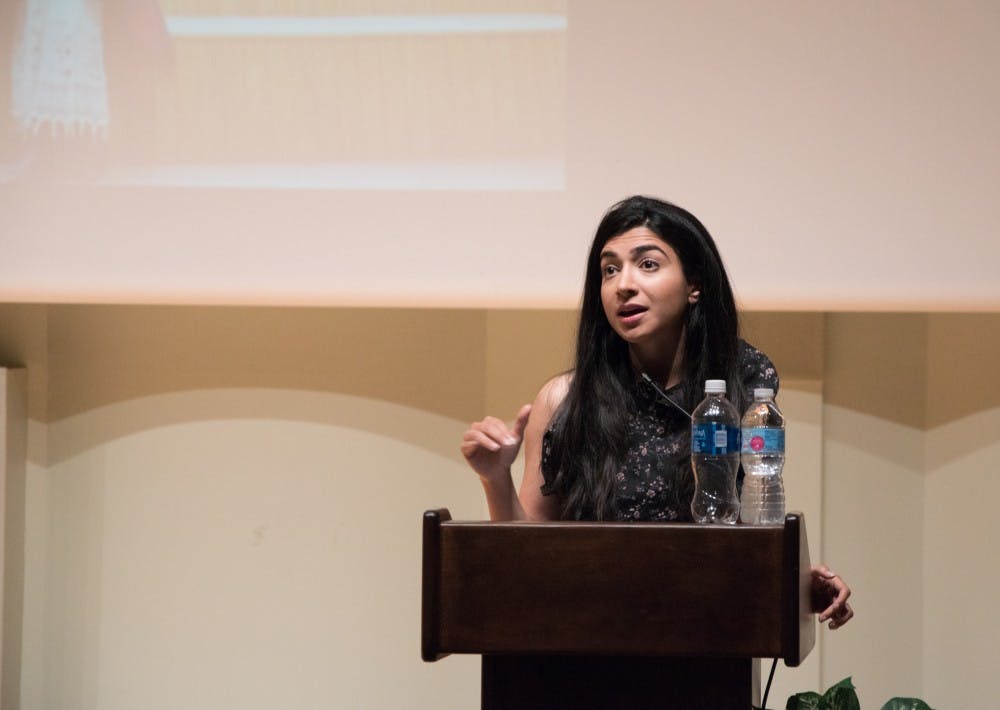Before the journey of life comes to an end, some want to be remembered for the memoir they wrote, the Grammy they won or the legacy they left.
But Shiza Shahid (pronounced Shi-za Shah-id), wants to be remembered as a kind person, who did something good in the world.
Shahid grew up in Islamabad, Pakistan, where she began volunteering anywhere she could get her foot in the door.
The then 13-year-old grew up as a social justice activist, who spent a majority of her time volunteering at a women’s prison and in relief camps. It was there Shahid began a life of constant curiosity — something she encouraged students to pursue during her Tuesday night talk in Pruis Hall.
“What I learned in these situations and these interactions, I would never had come to understand had I not set out to understand the world beyond the life I was born into,” Shahid said. “But these interactions in my youth were the beginning of the life of constant curiosity, openness and empathy and how I tried to interact with the world today.”
After spending her teenage years volunteering, Shahid applied to and attended Stanford University in Stanford, California. Despite being in a different country, she often still thought of Pakistan.
And while she spent every night with her phone on maximum volume, waiting for a phone call from home with bad news, it was the female education ban in 2009 that brought Shahid back to Pakistan for the summer.
“I remember sitting in my dorm room thinking, ‘Here I am at Stanford surrounded by all of this access and influence and girls 300 miles from where I grew up being told they cannot go to school.’ I figured there had to be something I could do,” Shahid said.
So, she did something.
That summer, Shahid went back to Pakistan and started a secret camp for 26 girls from the Swat Valley.
At the camp was 12-year-old Malala Yousafzai, who later became the youngest person to receive the Nobel Peace Prize.
“But what I could have never imagined back then is that one of the little girls I created the summer camp for would go on six years later to become the youngest ever Nobel Peace Prize winner and one of the most powerful voices for change in the entire world. That I could not have predicted,” she said.
But it wasn’t until 2012 that the pair would reunite.
In October 2012, 15-year-old Yousafzai was shot in the head by a member of the Taliban due to her speaking up for female education rights.
When Shahid received the news, she immediately left work to be with Malala and her father. It was there Shahid decided to quit her job and help create the Malala Fund — a fund that strives to create a world where every girl can learn and lead without fear, according to its website.
“I knew that it was now or never,” Shahid said. “So, I quit my job at 22 and stayed with Malala and I have to say it was one of the best things I’ve ever done. I believe that in our lives, in our careers, in our relationships, in our values there are certain moments where we have to decide who we are. In those moments, I urge you to listen to your heart and to be bold.”
Shahid spent the next two-and-half years helping Yousafzai and her father tell her story and the story of the 130 million girls who are denied education, but after she knew Malala was safe and the fund was growing, she left to pursue her next journey: Now Ventures.
“I knew we had shattered stereotypes about what power looks like, what courage looks like and what girls can achieve if they are just given an education,” Shahid said. “I always knew with Malala safe and healthy and the Malala fund growing in impact, that it was time for me once again to get out of my comfort zone.”
Now, Shahid’s focus is helping mission-driven start-ups like Lucy — a company that wants to make a workplace for working parents.
While the organization might have changed, the mission for Shahid is still the same as it was when she was 13: show up with passion and start helping.
Contact Mary Freda with comments at mafreda@bsu.edu or on Twitter at @Mary_Freda1.





